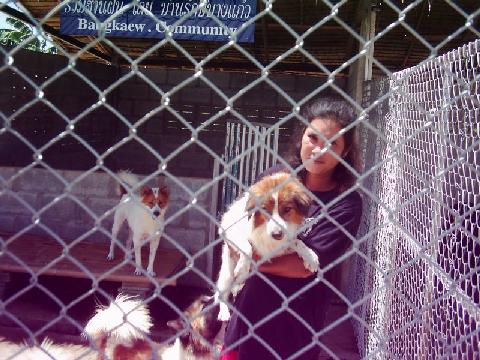Some hints for locating a responsible breeder
--------------------------------------------------------------------------------
Introduction
Locating a responsible breeder
Buyer beware
Breeder Beware
--------------------------------------------------------------------------------
Introduction
Responsible breeders answer buyers' questions, keep puppies they cannot place, allow +++es to recover sufficiently from one breeding before doing another, and take back any puppy that does not work out. They breed dogs because they admire their breed and want to contribute to its betterment. They guarantee their pups free of genetic diseases common in their breed and replace the pup if the disease should crop up. They consider the puppies they produce to be their responsibility for the life of that puppy, so they follow-up frequently to see what's going on.
They evaluate their puppies as show and breeding quality or pet quality and sell pet puppies with a spay-neuter contract. Pet quality puppies are not deficient - they just may not meet the breed standard for size, color, coat type, bone structure, head type, etc. Many responsible breeders sell pet puppies at a lower price than show puppies.
--------------------------------------------------------------------------------
Locating a responsible breeder
Area kennel clubs are excellent sources of information about local breeders. Obedience training clubs in your area also offer promising leads. Veterinarians, groomers, boarding kennel operators, and pet supply outlets may also be good sources.
Using newspaper classified ads to locate a breeder is a gamble. Few responsible breeders advertise in local classified ads because they have no trouble placing their dogs, sometimes years in advance. Therefore most breeders who advertise in these sections are amateurs who know little about their breeds. If you must enter the classified sweepstakes at least learn the terminology of classified ads.
The first interview with a breeder should be done without seeing the puppies so judgement doesn't get clouded by adorable, furry bundles. Ask to see sire and dam of the litter, if possible, and assess their temperament. If either is overprotective or very fearful, head for the door.
Ask about the genetic diseases that affect the breed -- you should have a good idea of what they are from your reading. If the breed is a medium-to-large one, hip dysplasia is likely to be a problem, so don't accept excuses for failure to x-ray and certify the dog free of the condition.
Ask about the contract and the guarantee and for names of previous puppy buyers as references. Ask if dogs from this breeder are active in dog sports even if you never intend to participate. Dogs that earn obedience, tracking, hunting, herding, water, or conformation titles; work as sled dogs, therapy dogs, assistance dogs, or search and rescue dogs; or participate in sports such as agility, Frisbee, or schutzhund are definitely trainable. The more complex the sport, the more there's a need for intelligence.
Ask to see the pedigrees of sire and dam. If there are lots of champions or titled dogs in the pedigree, the puppies are most likely good physical examples of the breed. Ask for the OFA ratings on the sire and dam, not only the OFA number. Ratings can be fair, good, or excellent. Chances of good hips in the offspring are higher with parents rated good than with those rated fair, and are even better with parents rated excellent.
Expect the breeder to ask you some questions as well. After all, a responsible breeder wants to know what kind of a home and family his puppies are getting as well as the color of your money.
--------------------------------------------------------------------------------
Buyer beware
When you decide the time is right for a puppy, spend at least as much time looking as you would in shopping for a new car or a special dress or suit. A puppy is a long-term investment: hopefully he'll be with you for 10-12 years or more. Here are some questions to ask breeders.
Will you help us pick the right puppy for our needs?
Are your breeding animals registered with the OFA (Orthopedic Foundation for Animals) Hip Dysplasia Registry?
What are their registration numbers?
Are your breeding animals certified free of PRA and other eye diseases?
Do you guarantee the hips and eyes of the puppies?
What are your terms if the puppy does develop genetic problems?
Can we visit the parents of the litter?
Will you give us the names of other puppy buyers?
Do you require that pet puppies be spayed or neutered?
Will the puppies have their first shots?
At what age do you place puppies? (Puppies should stay with Mom and siblings for at least seven weeks.)
Responsible breeders are forthcoming with this information. Make sure you have the answers before you look at the puppies -- it's hard to walk away from a wriggling bundle of fur that's licking your face or tugging on your ankle!
--------------------------------------------------------------------------------
Breeder beware
A truly responsible and professional breeder cares where his puppies will grow up. He will keep any puppies he cannot place in suitable homes and will question prospective buyers closely to determine if this buyer really needs one of his precious puppies.
Good breeders ask some or all of the following questions:
Have you ever had a dog before? If so, what type of dog? How long did you have it? Some breeds are not suitable for first-time dog owners, and some are just what the doctor ordered for neophytes.
Are there children in the family? How many? What ages? Some breeds are good with children, some prefer older, considerate children, and some don't get along with children at all.
(More on children and dogs)
Do you live in a house or apartment? If an apartment, does the landlord allow dogs? Some breeds do quite well in confined spaces, while others need room to stretch and wander.
[More on dogs and apartments]
Do you have other pets? Some breeds are naturally aggressive to other animals, including dogs and cats, and some get along very well with all God's critters.
Do you have a fenced yard? No dog should be left outside unattended, and no dog-aggressive or guardian breed should be confined by only an electronic fence. These fences may keep the dog in but they do not keep trespassing children or other dogs out.
What do you do for exercise? High energy breeds such as Dalmatians, retrievers, Border Collies, and Australian Shepherds need a brisk daily walk or jog of a mile or more to satisfy their physical and psychological need for exercise.
Do you know the dog laws in your community? No responsible breeder wants to sell a puppy to a buyer who does not plan to obey leash and confinement laws.
Do you plan to obedience train this puppy? This is a crucial question for breeders of guardian dogs such as Akitas, Rottweilers, Boxers, German Shepherds, Dobermans, etc. An untrained guardian dog can easily become a domineering pet with severe behavior problems.
Are you aware of the costs involved in veterinary care, including spaying and neutering, purchasing a good quality dog food, boarding the dog when you are away, annual license fees, etc.?
Are you aware that you are taking on the responsibility of another living creature who will, for the rest of its life, be dependent upon you?
If you can answer these questions in a positive manner, you are a good prospect for one of the breeder's puppies. Remember though, the really good breeders have a sixth sense about people. They will scrutinize your behavior with their dogs, the dogs' behavior with you, and the behavior and attitudes of your children. If the children are rowdy and disobedient, chances are your dog will be too, and the breeder may not want one of her dogs going to your home.
[url] http://www.canismajor.com/dog/responbr.html [/url] |
|



